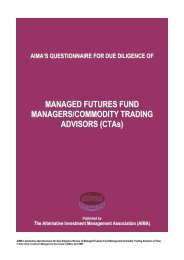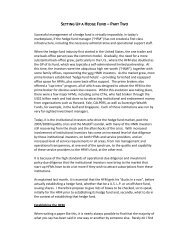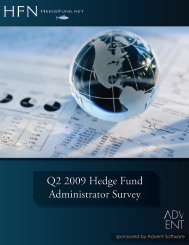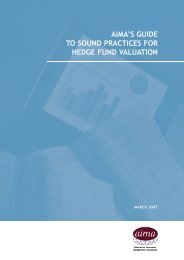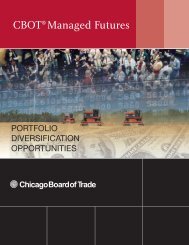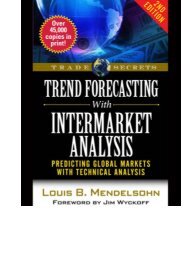Lintner Revisited: A Quantitative Analysis of Managed ... - CME Group
Lintner Revisited: A Quantitative Analysis of Managed ... - CME Group
Lintner Revisited: A Quantitative Analysis of Managed ... - CME Group
Create successful ePaper yourself
Turn your PDF publications into a flip-book with our unique Google optimized e-Paper software.
cmegroup.com<br />
Hidden sources <strong>of</strong> risk that many hedge fund investors do not fully<br />
appreciate are the structural and operational risks associated with<br />
investing directly into a fund vehicle. Fund investments require the<br />
investor to transfer money to the trading manager with an implicit<br />
guarantee that it will be returned at some future date. Wiring<br />
money to the manager exposes the investor to the risk <strong>of</strong> fraud or<br />
theft <strong>of</strong> the investment. <strong>Managed</strong> account investments mitigate<br />
this risk by giving the manager limited power <strong>of</strong> attorney to trade<br />
on behalf <strong>of</strong> the investor, who maintains legal custody <strong>of</strong> the cash<br />
and instruments at his FCM. Wiring money to a manager also<br />
exposes the investor to operational risks, and requires expensive and<br />
time-consuming due diligence on the manager’s middle and back<br />
<strong>of</strong>fice processes, as well as its service providers. Fund investments,<br />
including those in liquid instruments, <strong>of</strong>ten attempt to impose<br />
lockups, gates, or onerous redemption terms on investors. Most<br />
fund documents also give the general partner the right to suspend<br />
redemptions, in effect providing the manager with a call option<br />
on the liquidity it had previously <strong>of</strong>fered investors. There is no real<br />
value added by having the money housed with the manager who<br />
is being paid to try and provide an attractive risk-adjusted return<br />
over time with proper risk controls. Managers who refuse to grant<br />
managed accounts are in essence refusing to give transparency and<br />
are subjecting their clients to additional risks.<br />
Returning to the ever-important topic <strong>of</strong> liquidity, it is worth<br />
pointing out that from a behavioral finance point <strong>of</strong> view, it is easy<br />
for investors to underestimate the value <strong>of</strong> liquidity [Bhaduri and<br />
Whelan, 2007]. If a hedge fund is trading illiquid instruments and<br />
has a long lock-up, then simply comparing its return statistics to a<br />
CTA that is trading exchange-traded instruments and does not have<br />
a lock-up is incorrect, since it does not assign a value to liquidity<br />
[Bhaduri and Art, 2008]. Lock-ups by private equity funds and<br />
hedge funds trading illiquid instruments cost the investor in terms<br />
<strong>of</strong> reduced flexibility, and they should be rewarded with higher<br />
returns to compensate for this. There are not yet many measures<br />
or instruments to deal with this problem [Bhaduri, Meissner, and<br />
Youn, 2007].<br />
16<br />
Past performance is not necessarily indicative <strong>of</strong> future results.


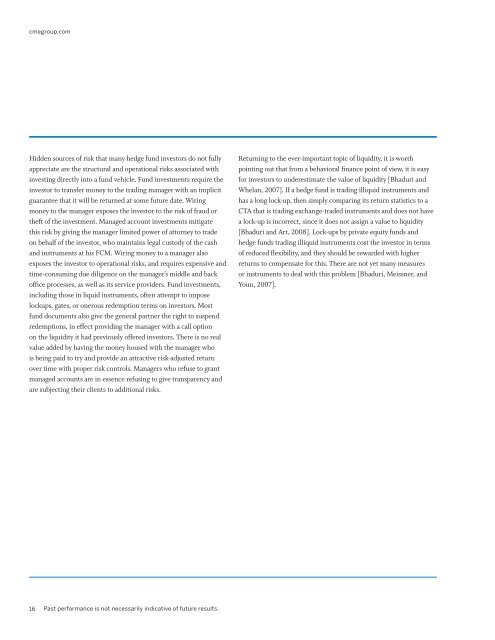
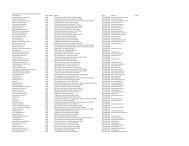
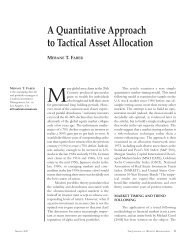
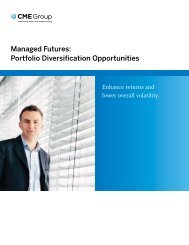
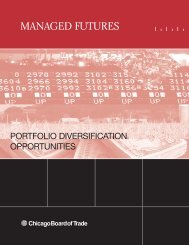
![Definitions & Concepts... [PDF] - Cycles Research Institute](https://img.yumpu.com/26387731/1/190x245/definitions-concepts-pdf-cycles-research-institute.jpg?quality=85)

